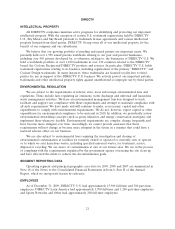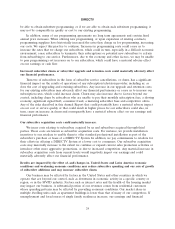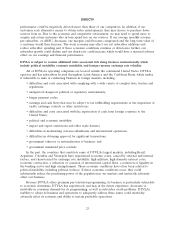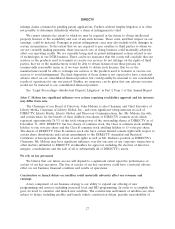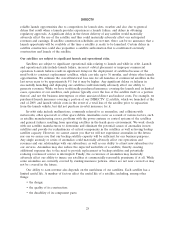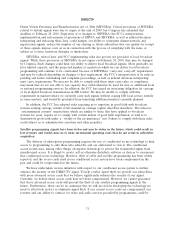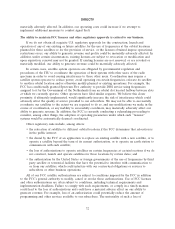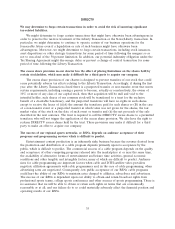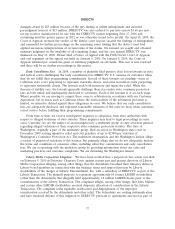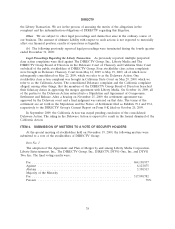DIRECTV 2009 Annual Report Download - page 42
Download and view the complete annual report
Please find page 42 of the 2009 DIRECTV annual report below. You can navigate through the pages in the report by either clicking on the pages listed below, or by using the keyword search tool below to find specific information within the annual report.DIRECTV
We depend on the Communications Act for access to cable-affiliated programming and changes
impacting that access could materially adversely affect us.
We purchase a substantial percentage of our programming from programmers that are affiliated
with cable system operators, including key RSNs. Currently, under certain provisions of the
Communications Act governing access to programming, cable-affiliated programmers generally must sell
and deliver their programming services to all MVPDs on non-discriminatory terms and conditions. The
Communications Act and the FCC rules also prohibit certain types of exclusive programming contracts
involving programming from cable-affiliated programmers.
Any change in the Communications Act or the FCC’s rules that would permit programmers that
are affiliated with cable system operators to refuse to provide such programming or to impose
discriminatory terms or conditions could materially adversely affect our ability to acquire programming
on a cost-effective basis, or at all. The Communications Act prohibitions on certain cable industry
exclusive contracting practices with cable-affiliated programmers were extended by the FCC through
October 2012, though it is currently considering proposals that could shorten the term of this extension
if a cable operator could show that competition from new entrant MVPDs had reached a sufficient
penetration level in the relevant marketing area.
In addition, certain cable providers have denied us and other MVPDs access to a limited number
of channels created by programmers with which the cable providers are affiliated. In other cases, such
programmers have denied MVPDs high definition feeds of such programming. The cable providers
have asserted that they are not required to provide such programming (or resolution) due to the
manner in which that programming is distributed, which they argue is not covered by the program
access provisions of the Communications Act. The FCC recently adopted new rules under which such
programming would also be subject to certain non-exclusivity and non-discrimination requirements.
These rules have not yet gone into effect, and likely will be challenged in court. In addition, they will
require a further evidentiary showing by an MVPD seeking access to such programming. If these new
rules are successfully challenged in court or we cannot make the required evidentiary showing, we may
continue to be precluded from obtaining such programming, which in turn could materially adversely
affect our ability to compete in regions serviced by those cable providers. Although the FCC also
addressed some of these issues in a limited fashion by placing access conditions on certain regional
sports networks affiliated with Time Warner Cable, Inc. and Comcast Corporation, it is not clear that
we will be able to assure continued access to this programming on fair and nondiscriminatory terms.
DIRECTV itself is subject to similar restrictions with respect to certain programmers affiliated
with us. The FCC imposed a number of conditions on its approval of Liberty Media’s acquisition of
News Corporation’s interest in DIRECTV in 2007. Among other things, those conditions require
DIRECTV to offer national and regional programming services it controls to all MVPDs on
non-exclusive and non-discriminatory terms and conditions, and prohibits DIRECTV from entering into
exclusive arrangements with affiliated programmers or unduly influencing such programmers in their
dealings with other MVPDs. The conditions also require DIRECTV to engage in ‘‘baseball style’’
arbitration if elected by an MVPD where the parties cannot agree on terms and conditions for carriage
of RSN programming owned, managed or controlled by DIRECTV. This condition currently applies to
the three RSNs DIRECTV acquired from Liberty Media in 2009.
Changes to and implementation of statutory copyright license requirements may negatively affect our
ability to deliver local and distant broadcast stations, as well as other aspects of our business.
We carry the signals of distant broadcast stations pursuant to statutory copyright licenses contained
in the Satellite Home Viewer Improvement Act (SHVIA) and its successors, including the Satellite
30



